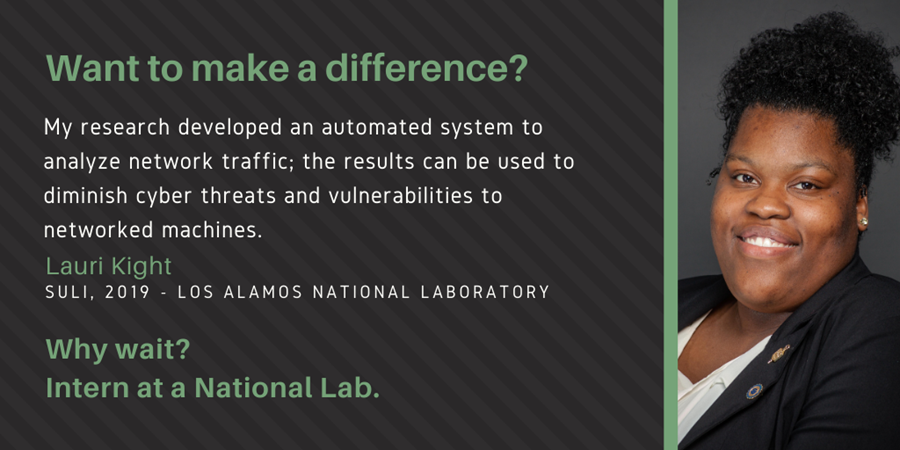Lauri Kight
SULI Intern Researches Cyber Threats

Internship program: SULI
Year: Summer 2019, Fall 2020
Undergraduate institution: Carl Albert State College and Southern University and A&M College
Major: Mathematics
Host DOE laboratory: Los Alamos National Laboratory (LANL), Los Alamos, NM
Mentor name: Dean A Prichard
What was your research topic during your internship?
Cyber threats can cause damage to networked machines and the valuable data stored on them. Analyzing network traffic to understand the amount of data moving across a network at a given point of time can help to reduce threats and expose vulnerabilities to machines on the network. My research developed an automated system to analyze network data. Initially, network data “packets” were analyzed manually, but this process was too massive for the number of data packets. Instead, my research found a better method using a reliable, secure and open source project called ELK. Two components of ELK were utilized: Elasticsearch and Kibana. Elasticsearch stores, searches, and analyzes big volumes of data quickly and in near real time. Kibana performs advanced data analysis and visualization. These tools allows data packets to be analyzed and displayed quickly, and the results can be used to diminish cyber threats and vulnerabilities.
What was it like coming to a National Lab for your internship?
The Lab provided me with experiences that broadened my perspectives, both academically and socially. Working with top researchers and scientists in state-of-the-art research facilities elevated my skills and enhanced my professional network. Attending an HBCU (Historically Black College and University) for undergraduate studies prepared me academically, however, being able to research and work on real problems provided experiences that do not often take place in the classroom. While at the lab, I was able to implement concepts from my coursework to perform advanced research and contribute to the work and my team. Socially, I met so many people and other students with diverse backgrounds and cultures. I was a little intimidated at first, but I quickly adjusted with the assistance of my mentors and team members.
Describe a concern you had while considering or applying to the internship. What advice would you give to help a student with the same concern today?
Look at your next internship as an opportunity to distinguish yourself from your peers. One of the key parts of an internship is getting to experience a specific role or industry so that you can decide whether it’s something you want to pursue after graduation. When picking an internship, look for one that offers you a truly hands-on experience. This will allow you to make well-informed decisions down the line and find the career path that works best for you.
Think of a time you experienced success during your internship. What did this success look like?
The decision to network was key to my success while interning. I was in a new state with no family, friends, or personal mentors. Before I left my institution, my professor told me “Lauri, you have to network to be successful.” On my first day, I met my now best friend for life. Meeting her made my internship so much fun. It helped that we had similar interests and career goals. When she had meetings or networking events, she always invited me to attend.
Think of a time you experienced failure during your internship or academic career. How did you feel at the time? How did you deal with the failure and work past it?
When I received my internship, I was worried about how well I would understand the research. The research was dealing with cyber security and data analysis. Being a pure mathematics student, I did not a have strong background in programming or cyber security. In college, I had only taken one computer science class. I did not know anything about network protocols, firewalls, and Linux. My confidence level was very low heading into my first day. My mentor was great and gave me a book to read on my research topic. Then it was time to apply everything I read. The process of learning the material was complicated at times. Once I finally understood, I started to love what I was researching, and it showed to my mentors. They provided constant feedback which helped me grow and gain confidence. I enjoyed cyber security and creating visuals. Furthermore, my mentors helped me gain knowledge and provided pathways for me to open up and embrace new learning and sharing experiences.
What are your hopes for your career?
I would like to work for a National Lab or one of the federal government agencies. I just completed an internship with the Department of Defense and I am back working at Los Alamos National Laboratory as a post-undergraduate student. My team will be researching the thermal effect of open water bodies on permafrost in the Arctic using two different models. I plan to learn and contribute as much as I can. I believe this experience will help prepare me for future work in the areas of research, data analytics, computer programming, and mathematical modeling.





